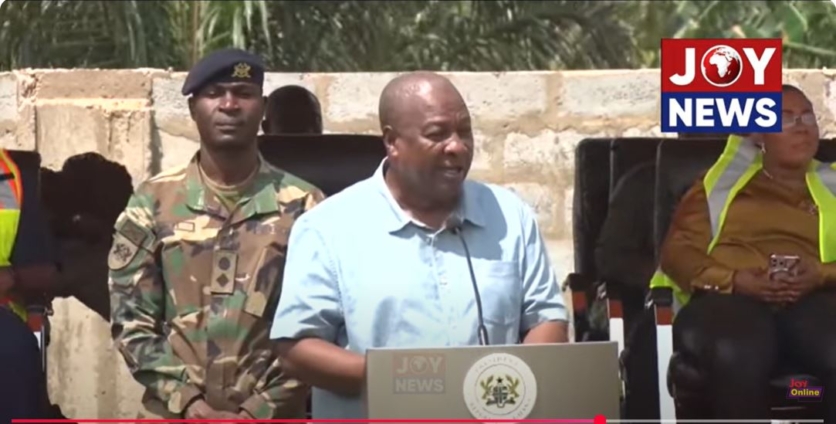Mahama's Mammoth 'Big Push': Infrastructure Revolution Sweeps Ghana, Sparks Contractor Debate!

President John Dramani Mahama officially launched the government’s ambitious Big Push infrastructure programme on Tuesday, September 16, 2025, at Afienya in the Greater Accra Region. This flagship initiative aims to usher in nationwide development by ensuring an equitable share of road projects across all 16 regions of Ghana. President Mahama emphasized that the Big Push is meticulously designed to modernize the country’s road network, significantly enhance inter-regional connectivity, and unlock new economic opportunities across the nation.
The program sets out to construct 5,000 kilometers of roads across 166 constituencies over a three-year period, with each constituency benefiting from approximately 10 kilometers annually. The overall project cost is estimated at $10 billion, with a more specific allocation of GH¢13.85 billion (US$892.9 million) designated for 42 particular road projects within the framework of the Big Push. President Mahama outlined key priorities, starting with the construction of vital roads connecting regional capitals to facilitate easier travel and bolster national unity. He cited examples like making travel simple between Accra and Ho, or Accra and Cape Coast.
Following this, the second phase of projects will concentrate on roads linking district capitals to improve local accessibility across Ghana’s 261 districts. Additionally, dedicated attention will be given to roads situated in major food-producing areas and industrial zones, which are deemed crucial for the country’s economic transformation. The President affirmed that these initiatives would lay a strong foundation for Ghana’s future prosperity.
President Mahama also stressed the importance of engaging only competent and well-resourced contractors for the Big Push. He clarified that the program is not intended for inexperienced or small-scale operators, whom he referred to as “wheelbarrow contractors,” as its objective is to accelerate large-scale national infrastructure projects without dilution. A rigorous vetting process has been undertaken to select contractors based on their proven capacity and competence, ensuring high standards of quality and efficiency. The majority of selected firms are Ghanaian, underscoring the government’s commitment to building local capacity and leveraging domestic expertise. Foreign contractors with pre-existing contracts will also be incorporated, with their projects repackaged and integrated into the Big Push for swift completion.
Quality assurance is paramount, with President Mahama highlighting that the durability of roads hinges on proper groundwork and compaction, cautioning against rushed surface work that leads to premature deterioration. To ensure accountability and transparency, an Advisory Secretariat, staffed by engineers and technical experts, has been established under the Office of the President. This body will conduct regular inspections and monitor progress at every construction stage. Furthermore, the government has secured substantial financial backing, with assurances from the Finance Minister that certified contractors will receive payment within two weeks of submitting their certificates, thereby preventing delays.
A prime example of the Big Push’s transformative potential is the redevelopment of the Atimpoku–Asikuma–Anyrawasi–Ho–Denu–Aflao road, for which President Mahama officially cut the sod at Tritrinu. This significant stretch links several key towns across the Volta Region and serves as a vital corridor to Togo, promising improved road safety, reduced travel times, and new opportunities for trade, tourism, and socio-economic growth. Contractors for these projects are strategically allocated sections to ensure efficiency, with no single contractor expected to spend more than 24 months on a stretch, as works are divided into manageable phases.
The impact of the Big Push extends to local communities, with the Municipal Chief Executive of the Awutu Senya East Municipal Assembly, Seth Sabah Sewornu Banini, confirming that several roads within his municipality, including the Otter City to Peace Town, Tipper-Junction to Peace Town, and Ofakor to Gadah stretches, are earmarked for construction. These projects are expected to link major communities, improve motorability, and reduce commuter travel distances. Beyond roads, the Big Push framework includes parallel investments in essential social amenities such as schools and hospitals, reflecting a holistic approach to national development.
You may also like...
Man Utd's Amorim Assurance: Chiefs Back Manager Despite Struggles

Despite a devastating derby loss and their worst league start since 1992, Manchester United chiefs are standing by Ruben...
Arsenal's UCL Glory: Martinelli's Blitz & Bilbao Battle Scars

Arsenal secured a winning start to their Champions League campaign against Athletic Bilbao, overcoming a challenging fir...
Man of Steel Lands: James Gunn's Superman Gets Exciting Streaming Debut Date!

James Gunn's <i>Superman</i>, starring David Corenswet, is set to arrive on HBO Max this Friday, September 19, following...
Frozen 3 Shakes Up Disney's Formula With Plot Twist Not Seen in 25 Years

The plot for Disney's upcoming 'Frozen 3' has been revealed, teasing a royal wedding between Queen Anna and Kristoff, an...
Farewell to a Legend: Iranian Singer Hooshmand Aghili Dies at 88

Hooshmand Aghili, a revered musician whose voice defined generations for the Iranian diaspora, passed away at 88. His il...
Tune In! BillboardTV to Launch 24/7 Music Channel on Samsung TV Plus

Billboard and Samsung TV Plus have launched BillboardTV, a new 24/7 streaming channel dedicated to music culture and new...
Little Mix Star Jade Thirlwall's Shocking Sacrifice for Diana Ross Sample!

Jade Thirlwall's debut album, "That's Showbiz Baby!", is making waves, featuring a bold sample of Diana Ross's "Stop! In...
Millionaire Pop Star's Wild Undercover Stag Do Adventure at Butlin's Revealed!

Discover the latest from the entertainment world, including Ed Sheeran's surprising love for Butlin's holidays, Paul Mes...
